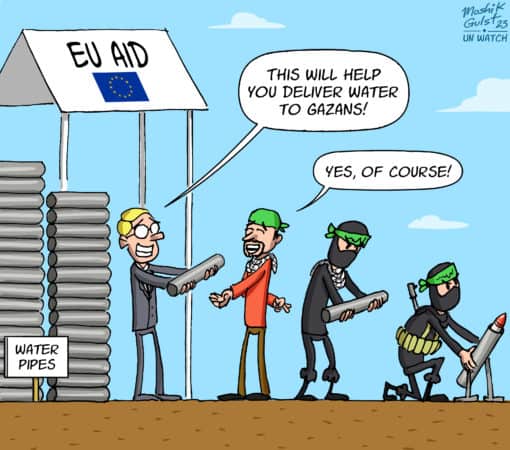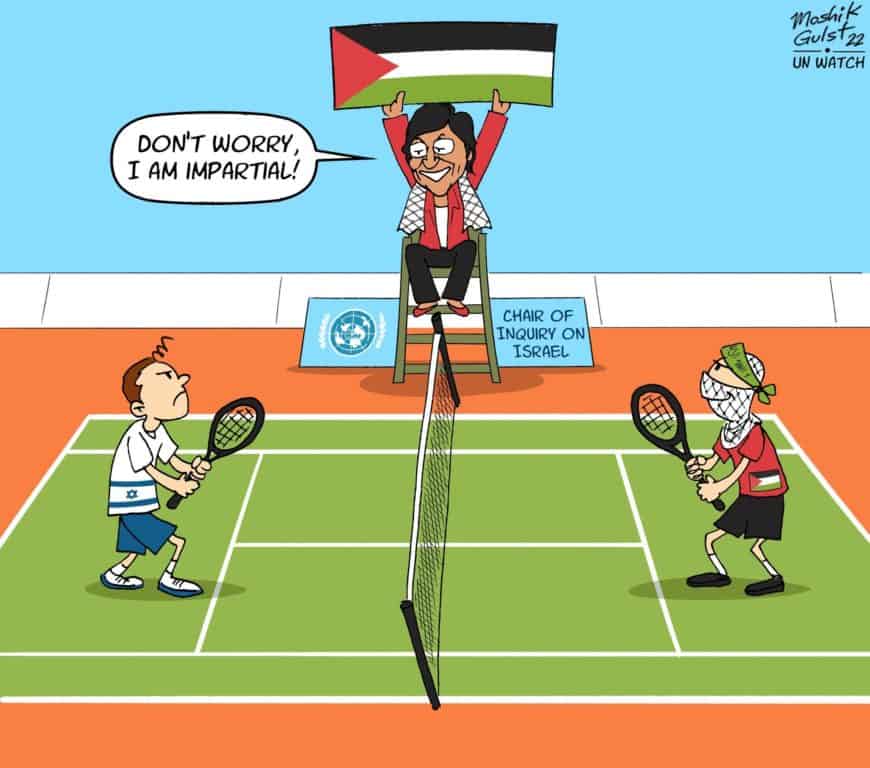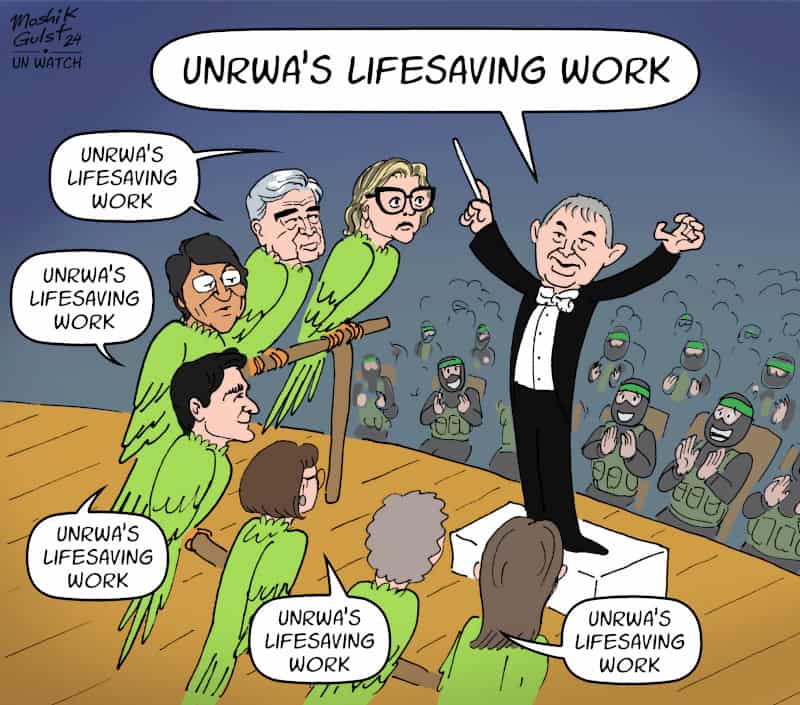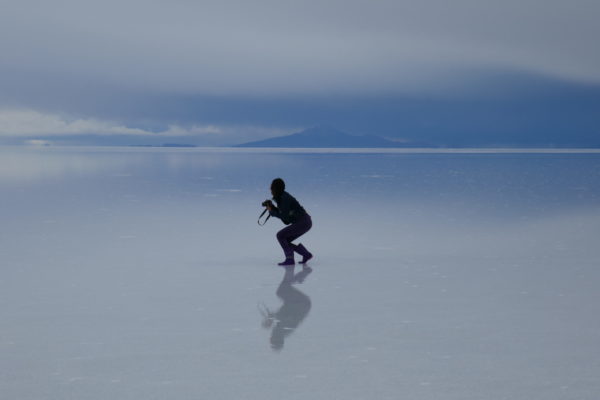I have worked with international NGOs in the capital of human rights, Geneva. I cofounded one of them, and founded yet another in Latin America. I know the international world as a practitioner and it seems necessary to me to denounce the damaging activities of UN Watch. The latter has been around for two decades and is damaging the international system by distorting the general public’s perception of the institutions. When lies and biases are produced with the sole aim of reinforcing our positions, they lead us into an alternative truth that closes the door to dialogue.
A few clarifications, however: the purpose of this article is not to discuss whether or not Israel respects human rights, but rather to provide information on the activities of a lobby that is considered harmful. It addresses the effects of UN Watch on the Jewish community, which is particularly targeted by the disinformation promoted by the NGO.
This article is due to several meetings and a long reflection since the Hamas attack on October 7, 2023; since this massacre, the radicalization of identity politics has reached a level reminiscent of the Bush years (2001-2009), when any discussion based on law or reason was impossible. Those were the days of “if you’re against us, you’re with the terrorists”.[1].It was the beginning of the era when the UN was blamed for its very foundations, namely being a platform for dialogue, not war. International law was hated by American neo-conservatives, who wanted to invade Iraq free of any international constraints from the UN. Bolton, a prominent neo-conservative in the Bush administration who has always favored war – including preventive war – over peace, was one of the main crusaders in the attack on the UN. Today, the same war propaganda is at work, boosted by social networks.
But what’s so terrible about UN Watch? It’s an organization that helps delegitimize international institutions by usurping the title of NGO. It has become very popular in certain communities. An NGO about which no one dares speak out, because human rights activists prefer to ignore it, or fear it. An organization whose influence is inversely proportional to its size (barely a dozen employees perhaps), and which has been producing ready-made language to defend Israel for some twenty years now.
Its method? Relentlessly attack the UN and its experts, as well as international NGOs, in videos and memes, both inside and outside the UN, including an impressive number of interviews with its director, Hillel Neuer. UN Watch attacks the foundations (universality and dialogue) of the UN, its employees and its experts. It also attacks NGOs that take a stand on Israel; Kenneth Roth, the former director of Human Rights Watch and nicknamed the “godfather of human rights”, who was in charge of studying and advocating for improvements in human rights in 193 countries around the world, bore the brunt of this. For a decade, his every move was tracked down and accounted for, insofar as they concerned a single taboo state: Israel.
Before presenting this NGO, it is worth recalling what the UN and international NGOs are, their structure and aims, and then demonstrating how UN Watch’s work undermines the credibility of these bodies, and represents a peril to be taken seriously. The delegitimization of the international human rights system puts us all at risk.
Is the international world good for everyone?
The world of international organizations (IOs) and non-governmental organizations (NGOs) remains mysterious to the general public. A universe of experts, jurists, diplomats and specialized activists, this microcosm carries with it three original sins: firstly, it has never been able to explain its failings honestly; secondly, it has never been able to communicate its successes effectively; and thirdly, it is suspected of being at the service of people’s conflicting interests, manipulated by random interest groups, sometimes the West, other times China, the Jews or even Muslim countries.
Of these three sins, the third is not one of them, for it goes to the heart of the UN’s functioning: a global, globalizing, globalized organization. At this point, it may be useful to introduce the first two paragraphs of the preamble to the UN Charter[2] :
| WE THE PEOPLES OF THE UNITED NATIONS DETERMINED to save succeeding generations from the scourge of war, which twice in our lifetime has brought untold sorrow to mankind, and to reaffirm faith in fundamental human rights, in the dignity and worth of the human person, in the equal rights of men and women and of nations large and small, and to establish conditions under which justice and respect for the obligations arising from treaties and other sources of international law can be maintained, and to promote social progress and better standards of life in larger freedom, AND FOR THESE ENDS to practice tolerance and live together in peace with one another as good neighbours, and to unite our strength to maintain international peace and security, and to ensure, by the acceptance of principles and the institution of methods, that armed force shall not be used, save in the common interest, and to employ international machinery for the promotion of the economic and social advancement of all peoples, |
Peace, tolerance and development are the goals for all mankind, and the means to achieve them is dialogue above all. This Charter was developed during the Second World War, at a time when millions of people were dying and looking for a way out of the new total wars of the 20th century. A mechanism to force people to stop gutting each other. Equality – one voice, one vote – will be the chosen formula[3] to ensure that all countries join the United Nations, and agree to participate. The success of the UN, of which every country in the world is now a member, lies in its universality, its equal treatment of all its members. If the intense tensions of the Cold War didn’t lead to its demise, it’s because all members, in one way or another, benefited from it. Equity, the balance of power between countries and regions, is discussed and put on the table every day in UN bodies; and it can be said without shame that this practice is excellent, because it demonstrates that all states see the UN as a place to discuss and debate their national interests – rather than to wage war. If we are living through the period of modern history with the fewest wars between nations, it is perhaps because the UN culture of dialogue has taken hold.
Yet, since the end of the Cold War, the accusations levelled at the international system have multiplied: the grievances of the alterglobalists of the 1990s and 2000s, who dreamt of a path to greater equality through international order, have been superimposed on, or even replaced by, a new disapproval: that of the “anti-globalists”. The latter refute the very necessity of international organizations and multilateralism: the very nature of the UN is unbearable to them, whose members include a large number of illiberal and dictatorial countries; how could we, as a democracy, sit at the same table as Iran and China? After the Second World War, dialogue was the preferred tool for avoiding war, and now it’s being mocked. Only force can save us from a new Munich Agreement, the new paragon of international cowardice. In the USA, George W. Bush, followed by the tea party, were the first major expressions of this movement challenging the validity of the UN. And the organization UN Watch, which under its founder Morris B. Abram supported the international system (“I recognize and take full account of the vagaries and contradictions of international diplomacy. I accept the primacy of realpolitik in international relations,” Ambassador Morris B. Abram, The United Nations Treatment of Israel, testimony of Ambassador Morris Abram before the House of Representatives Committee on International Relations, 1999)), changes with his death, and very quickly[4], becomes anti-globalist. It will be the source of terrible misinformation within the Jewish community, but also far beyond.
From universal human rights with Jewish origins to a Jewish NGO to combat the universality of human rights
Why take an interest in Jewish opinion? Perhaps, first and foremost, because this community has helped to shape the international community in general, and the UN in particular. As UN Secretary-General Koffi Annan recalled in 1999, on the death of Morris Abram, founder of UN Watch:
I’m pleased to say that the Jewish community has had a strong presence at the UN from the outset. Representatives of the American Jewish Committee were in San Francisco when the Organization was created, and helped the authors of the Charter to instill a sense of justice and human rights.
Then pleaded:
We need your support in the campaign to ratify the Rome Statute of the International Criminal Court, which can serve as a bulwark against evil. We need you as allies throughout the United States, from Main Street to the halls of Congress, in our fight against isolationism and for multilateralism.
Although the UN was not immediately a child of the Holocaust, but born of the wider need to stop killing each other between nations [5], it is worth noting that the first international human rights treaty it adopted – unanimously – was the “Convention on the Prevention and Punishment of the Crime of Genocide”, in 1948. This treaty was mainly drafted by Raphael Lemkin, an eminent Jewish jurist who invented both the term “genocide” and a convention aimed at eradicating it. Subsequent treaties protecting human rights were inspired by Lemkin’s example.
The Jewish community is therefore essential to the history of human rights and to the progress of the UN. How is it possible that UN Watch, founded by members of the Jewish community and originally a constructive critic of the UN, has now become an anti-globalization organization? (See the presentation of the NGO in 2004, « We believe that even with its shortcomings, the UN remains an indispensable tool in bringing together diverse nations and cultures. » Note, however, that John Bolton was already on the NGO’s board in 2000))? That from being a potential ally in the creation of the International Criminal Court (ICC), it has become its enemy[6] ?

It is difficult to answer this question, given the lack of historical documentation available from the NGO UN Watch. We do not know exactly when its director Hillel Neuer took charge [7]. What we know with certainty is that Morris, the founder of the NGO, died in March 2000, and that John Bolton has been a member of the executive committee at least since October 2000[8]. And on January 1, 2001, UN Watch came under the control of the American Jewish Committee[9] (American Jewish Committee, a major Jewish lobby whose treasury weighs more than $270 million( (“American Jewish Committee“, ProPublica))), a transfer decided by Edgar Bronfman, president of the World Jewish Congress who was the first to support UN Watch since its founding in 1993. There is no equivalent in history international NGOs: they are not transferred from one organization to another, as if it were a simple company. They are held by their General Assembly; it is as strange as if we transferred the European Union to the UN.
In any case, the nature of this NGO changed fundamentally on the death of its founder. It enlisted the services of a neo-conservative, and began conflicting, never constructive, activities. It produces biased and partial information, reaching individuals who know neither the aims nor the working methods of the UN. Individuals who sometimes, suffocated by the ambient anti-Semitism, see it as a welcome escape to breathe again: if anti-Semitism is on the rise, it may well be, after all, the fault of the UN and international NGOs who are doing their job badly.
Jewish community or not, we are easily manipulated when we know nothing about a subject, and even more so when we seek to defend ourselves against attacks, anti-Semitic or otherwise: UN Watch offers the ideal scapegoat on a platter, this international mammoth that nobody understands or wants to understand. Through videos and press releases, UN Watch sums up in a few shocking phrases that the UN is biased, anti-Semitic, ineffective and incompetent. And it’s easier to destroy than to build, because to deconstruct this information, you have to explain precisely how the UN works. This is why, mechanically, the belief that the UN is illegitimate is instilled: we no longer need to listen to or read this organization’s documents, because UN Watch gives us the reasons to reinforce our biases by giving us justifications for no longer listening to anything that would contradict our opinion.
But the UN is, let’s not forget, about dialogue, about replacing war. However, let’s not adopt a naïve, contrary position to counterbalance the simplistic narrative of UN Watch: yes, the interests of States clash here, and international law is constantly instrumentalized, there’s no doubt about that. But just as the Olympic Games were a truce between wars, the UN is intended to be a place of truce between states, where they channel their violence into resolutions, dirty tricks between officials, stolen paper, a misplaced comma in a text and the opposing camp cries a “hurrah of relief” instead of firing the cannon.
However, while all states engage in this theatrical and ritualized warfare, international NGOs do not play with the same weapons. Those who do should be immediately disqualified. Criticizing the UN, as indicated in the introduction, is legitimate: this structure, a simple human construction, is not perfect, and all practitioners agree that it can and must be improved. In fact, the international NGOs involved with the UN play a key role in identifying avenues for improvement: they are expert and highly technical, sometimes much more so than diplomats, who rely on their knowledge to take a position. But while NGOs denounce all practices contrary to human rights, or the UN’s structural problems, they never defend a State; that would be crossing the Rubicon. Let’s look at how UN Watch’s work differs from that of international NGOs.
UN Watch is not an NGO
First of all, an international NGO is a non-profit association (or foundation) whose aim is to promote the common good. Without going into technical details, international NGOs can be generalist, covering all countries and all human rights (as is the case with Human Rights Watch and Amnesty International, for example), or thematic or regional (children’s rights for Save the Children, human rights in Asia for Forum Asia, for example). Despite major differences within NGOs, they all share at least three fundamental pillars: firstly, to promote universal values while remaining firmly independent, thus avoiding acting as a sounding board for a state; secondly, to adhere to international law, the foundation of their actions; and thirdly, to be transparent in their activities by publishing their statutes and their activity and financial reports.
No independence, no universality
UN Watch is an organization that does not seek the universal defense of human rights, but the protection of particular interests. In fact, its activities in defense of Israel go hand in hand with its human rights activities, which are used as window-dressing. It drowns its real aims in anecdotal conferences and speeches, organized to put on a good show. And even most of its activities “outside Israel’s protection” relate to Israel’s enemy countries [10].
First telling example, she rightly attacks (in the legal sense) the Cuban government by making activists[11] from the Caribbean island speak; but how is it that not once has UN Watch denounced the US embargo against Cuba, as all international NGOs do (“The priority should be the dismantling of the embargo”, HRW“[.. .]the board of directors of Amnesty International USA has called on the US Congress to pass bills […] that would effectively lift the embargo on Cuba.”, Amnesty))? How can we criticize the lack of democracy in Cuba, but not the US military policy against it? Could this be because of a resolution passed every year for decades at the United Nations General Assembly where all countries on the planet denounce the illegality of this embargo, with the exception of… two countries , namely the United States and Israel [12]? Or could it be because Cuba is one of Israel’s fiercest adversaries at the UN?
Another problematic example: UN Watch has never criticized, as far back as its archives can go, the State of Israel. On the contrary, it never stops protecting the Jewish state; there is no Western international NGO that protects a state. NGOs that do this are called “GONGO” [13], and are tools used for propaganda purposes by a government, whether We mask ourselves under the name of NGO to participate in the work of the UN. Unlike a universalist and independent NGO, UN Watch protects Israel against any attack, and ferociously attacks countries that attack this State [14], and for NGOs that express the slightest criticism of Israel.
No adherence to international law
International law is the very foundation of the work of international organizations, whether they are IOs (like the UN) or NGOs. It is a law in constant flux, but there are points which are not the subject of discussion by jurists: what is decided in the Security Council, for example, has binding force and every State must comply with it. , otherwise it violates international law. There are no exceptions, it is not even a debate among international lawyers.
It is therefore impossible for an independent and universalist NGO to rightly claim that states like Iran, North Korea or Eritrea are violating the United Nations Charter, and at the same time claim that Israel is complying with the law. international. Since 1967, a resolution adopted by the Security Council has been systematically ignored by the country of Ben Gurion. Many resolutions, non-binding but part of international law, suffer the same fate.
Please note, there is no question here of knowing whether Israel is right to ignore international law or not, because this becomes a political question and outside the scope of study here. The fact is that, since any NGO aims to participate in the development and implementation of the law, it is inconceivable to see that, in all its activity deployed, UN Watch pursues an objective which is not that of a International NGO. Whether it is Cuba, Israel, the USA or many other countries, UN Watch indeed applies what it criticizes the UN: a “double standard”.

If readers who read these lines find it legitimate to defend the State of Israel in the face of international fire, it is difficult to deny them this right. The Jewish State (or any other nation) is also authorized to defend itself and use lobbies. But let’s not mix roles: an NGO is not a lobby, confusion must be avoided at all costs otherwise all NGOs would become dubious. Indeed, the lobby pursues particular interests (patriotic or economic) unlike an NGO which defends universalist ideals.
All the ambiguity of UN Watch comes from the fact that, in order to establish its credibility, the organization presents itself as an international NGO (“UN Watch is a non-profit organization whose mission is to ensure that the United Nations respects its founding principles. Through its regular monitoring, UN Watch is a key resource for information and analysis on the UN […] UN Watch protects human rights around the world. …]”)), concerned about human rights around the world; it is a strategy intended to buy respectability and legitimacy when addressing the Jewish community. She never follows up on her denunciations on Venezuela, Cuba, or Eritrea. She does not seek to meet with the ambassadors of these countries, to strategize to actually produce change in the offending countries; its objective is to produce a speech, and not for this speech to be followed by effects. A posture for form, which obscures the effective lobbying work when it comes to defending one’s personal interests.
And, let’s face it, the UN Watch strategy has worked quite well so far. New York, Buenos Aires or Kenya, members of the community always have a ready-made meme or piece of language to defend Israel, which very often comes from UN Watch, even if they have never heard of this NGO .
No transparency
Finally, every NGO has a duty of transparency regarding its activities and finances. While international NGOs publish annual reports to inform their donors and the general public about their financial status and concrete successes, UN Watch does not publish an annual activity or financial report. Worse, UN Watch boasts of not doing so [15]. We can, however, estimate that its budget has increased from several hundred thousand dollars annually ((We know that at least one donor, the “American Jewish Committee”, supported UN Watch for an amount of USD 300,000 in the 2000s.) ) in the 2000s, to one and a half million in 2021 ((US Tax, “United Nations Watch”). Even more terrible: its statutes, the founding act of an NGO, are simply not available. We do not know its social purpose, its structure, its organs. In reality, we cannot even know if it is an association, a foundation, or a company. If it were not registered with a UN body, one might even doubt its legal existence [16]. And if we know nothing about UN Watch in Geneva, we note with surprise that a subsidiary (or a parent company?) has existed since 2011 in the USA [17]. This opacity is unique for an international NGO; only the “GONGOs” hide their activities and sources of financing.
For all these reasons, no international NGO collaborates with UN Watch[18] in Geneva, the world capital of the UN for human rights, which is nevertheless home to hundreds of associations and foundations working for common good. These organizations, which could find occasional interest in working with UN Watch – on Iran, Venezuela or Cuba, for example – refuse to associate even sporadically with an organization which, whatever the perspective envisaged, bears no resemblance to to an NGO.
How UN Watch is weakening the international system
In view of the above arguments, asserting that UN Watch is an international NGO is an act of faith. But we lose all faith if we look for good faith statements that should guide the NGO’s actions, because it is sorely lacking on anything that closely affects Israel. This organization has developed different lines of attack to denigrate all those who attack Israel, but one of its argumentative arrows, launched both at the UN and international NGOs, is based on the “double standards” of all global institutions and organizations. All would be guilty of treating Israel unfairly. It is necessary here to take the time to explain why, in fact, the UN has developed certain mechanisms which may seem unequal, but also to demonstrate that “double standards” do not exist within NGOs.
UN Watch against the UN

One of the main communication axes of UN Watch to denigrate the UN is based on the Human Rights Council (“7 Problems with the Human Rights Council“, UN Watch)) where “Israel is the only country Human Rights Council to be considered under a special agenda item. “. Indeed, alongside a series of points that are discussed (such as racism, the rights of freedom of expression, etc.) we also find “The situation of human rights in Palestine and in the other occupied Arab territories. According to UN Watch, this “hypocrisy” of the UN is part of the “double standards” that it denounces, namely that there are differential treatments depending on the country. Why is this misleading? Let us avoid the mole objection that it is not a country that is being attacked, but that it is a violation of human rights that is being decried; it would be correct but only technical. On the other hand, we can mention that this is the only situation contrary to international law, which is not linked to one of the 5 countries with the right of veto((Reminder: Russia, China, France, the United Kingdom and the United States can, through the right of veto, prevent any binding resolution from being voted on within the Security Council) and which has continued since 1967.
Is the Israeli-Palestinian conflict being exploited by many Arab-Muslim countries? This is undeniable; but isn’t the role of the UN to force States to respect international law? Could a lawyer argue before a French or American court that the perpetrator of misdeeds he represents should be released due to judicial harassment, arguing that justice should instead be interested in other criminals? The judges would laugh in his face.
This “double standard” argument is reminiscent of the positions adopted by African dictatorships regarding the International Criminal Court (ICC)[19] who complained of being unfairly targeted. It is true that, until 2023, all ICC cases concerned African nationals [20]. And dictatorship lobbyists complained about this “double standard”: why are only black people prosecuted by the ICC?
We see here a flaw in the UN system, but it is not the one claimed by UN Watch: the flaw here is that it is easier to attack the small than the big, because the small bends , unlike the big one. It is easier to prosecute Bosco Ntaganda at the ICC, a Congolese war criminal sentenced to 30 years in prison at the end of his trial, than George W. Bush, suspected by jurists of war crimes and crimes against humanity in Iraq and Afghanistan. The Congo is certainly more permeable to the pressures of international justice than the United States; but can we not be happy that Ntaganda is behind bars, and that justice is being done against him? Putting the little ones in prison should make us happy, while keeping in mind that, when international justice is more solid, we will pursue the big ones. Which seems to be the direction followed since 2023.
The impunity of some cannot justify the impunity of others. Israel is protected by the USA which has a right of veto in the Security Council. If this were not the case, the Jewish state would have already submitted to international law. So, it is not because of a “double standard” that Israel is so condemned at the Human Rights Council, but because persistently, since 1967, the international system has been seized up, and fails to bring this Middle Eastern nation to its knees. And even so, what’s the point of being offended? Should we not instead talk about the violation of international law? But since there are no legal arguments, UN Watch has no other option than to discredit the entire international legal system; it does not matter to UN Watch that its denunciations have consequences for the credibility of the UN, for the dialogue sought since the end of the Second World War within its UN walls; what matters is fulfilling your specifications, and not working for the common good. It does not matter if this questioning has the consequence that Zimbabwe or Cuba will subsequently refuse to sit at the negotiating table, claiming that the UN is useless, the legitimacy of the UN being called into question even by democracies.
UN Watch against international NGOs
But UN Watch not only protects Israel against the UN, it also defends it against international NGOs: Amnesty International and Human Rights Watch (HRW) are the bête noires of UN Watch’s Executive Director. Again, this is not to dismiss all criticism of international NGOs; they can make mistakes, and representing civil society provides no immunity. It’s healthy, for example, to criticize the absurd salary of former HRW director Ken Roth[21]. But when UN Watch attacks the latter, who has been in its sights for two decades, it doesn’t attack HRW’s legal thinking, but the man, and for reasons of “double standards” once again[22].
Let’s be perfectly clear: in the culture of international NGOs, such behavior is seen as gangster-like. UN Watch protects Israel at all costs, and even reproaches the director of a human rights NGO for taking an interest in human rights in just one country. Vindictive, UN Watch continued its pursuit even after Ken Roth left HRW. Alongside another lesser-known but equally noxious lobby called NGO Monitor[23], rejoice that Harvard, under pressure from its donors, refused to offer Roth a professorship[24].
It should be pointed out that all Muslim, African, European, Asian and American states complain without exception about HRW reports on their own state. Nobody likes criticism, and these states consider it biased, ideological, not taking into account the specificities of the country. But UN Watch is the only international NGO that complains about the reports on Israel by HRW and Amnesty International. It is never indignant about reports on the 192 other countries on the planet – nor has it ever blamed Israel for the slightest human rights violation.
Un impact mondial, une désinformation continue

The lies and inaccuracies intended by UN Watch have massive disinformation results. UN Watch is used to overkill, misleading headlines and minimalist explanations, all of which ultimately lead the world’s media to criticize the UN – journalists, particularly from the USA, are poorly trained to understand UN mechanisms. Sometimes, the pressure exerted by UN Watch is so intense that the UN bodies themselves are forced to provide an official response. For example, from the outset, UN Watch has specialized in accusations against UNRWA[25] and publishes over 30 articles[26] on UNRWA per year since 2015 (its attacks began at least as early as 2003[27]), and provides language for all the pro-Israel newspapers and lobbies; it has thus happened that the UN mission has had to officially defend itself against false attacks by the NGO[28], mentioning it by name in a statement. The same goes for the Office of the UN High Commissioner for Human Rights (OHCHR), accused by UN Watch of having provided sensitive information to Chinese diplomats[29]. Without proof, UN Watch held HCADH accountable for the death of Cao Shunli[30], one of China’s most famous human rights defenders.
Although the brutality of UN Watch is replicated in two decades of activity, its harmfulness is evident within the Jewish community. Since October 7, 2023, UN Watch memes, videos and articles have reached an unprecedented level. Useful tools for, in a few words, responding to criticism of the Ben-Gurion State. Anti-Semitism, hypocrisy, “double standards” – everything is legitimate to denigrate thousands of UN and NGO representatives. One comes to believe that these “enemies” preferred Hamas to Jewish democracy. “If you’re against us, you’re with the terrorists”, a way of cutting short any dialogue invented by George W. Bush in 2001, and taken up by neo-conservative John Bolton – a member of the Bush administration and a member of UN Watch’s Executive Committee – and by its director Neuer for decades: the UN is illegitimate for UN Watch, because its raison d’être is to outlaw war. Neo-conservatives don’t see the world that way. But the hardest thing about UN Watch’s activity is that it accomplishes its misdeeds while pretending to be an NGO, when it has none of the attributes.
In short, UN Watch’s aim is not to protect human rights, but to defend the Israeli government like any other lobby. It knowingly misinforms journalists, the general public and Jewish communities, who know nothing about what an NGO is, what the aims of the UN are, or even why it exists. UN Watch refuses to take part in any constructive discussion, to impose the slightest transparency on itself; outrage and manipulation are its only weapons, and it is trying to bring down the only mechanism that protects us from hell: the UN.
UN Watch, has betrayed the thinking of its founder, Morris Abram, a man concerned about Israel’s security, certainly, but aware that the challenge of international dialogue is more important than anything else. Perhaps because he was 27 in 1945, and acutely aware of what is at stake, with the UN and international law.
Références
- « Either you are with us, or you are with the terrorists.. », George W. Bush[↩]
- The full text of the Charter is available on the UN website.[↩]
- Except in the Security Council. The Security Council is a UN body where questions of security (peace and war) are debated. Five countries overrule any voted decision taken by this Council: China, the United Kingdom, the United States, France and Russia.[↩]
- John Bolton, an architect of US neo-conservatism and ideologue of US disengagement from the UN, is already on the 2000 Executive board.[↩]
- Discussions to create a world organization began even before the Final Solution was known to the Allies.[↩]
- See, for example, the director of UN Watch who declares that the ICC has no legal legitimacy to investigate crimes in Palestine, « Hillel Neuer calls out US. funding of UNRWA, blasts ICC investigation », i24 News, avril 2021[↩]
- The only one found when Hillel Neuer took office is approximately 2004.[↩]
- Composition of the executive committee in October 2000.[↩]
- “UN Watch, AJC Seal Partnership”, January 2001[↩]
- See UN Watch videos.[↩]
- “Cuban activists testify at United Nations“[↩]
- In the last vote in 2023, only two countries voted against the Cuban resolution, namely the USA and Israel, with one abstention, that of Ukraine: “General Assembly Concludes Consideration of Cuba Embargo with Adoption of Resolution Urging States to Repeal Laws Impeding Trade, Navigation“[↩]
- GONGO: Governemental Non-governemental Organization, in English or Organization non-governmental governmental in French[↩]
- We see, for example, that the UN Watch database does not present any violations of the Israeli state, and contains a section for each country “Voting record on Israel” as if it were a human right. Moreover, the difference between Israel, which does not contain a section “Human rights record “, while for Iran, this section is visible. This is not a way to work for a legitimate NGO.[↩]
- Sarcastically, UN Watch published a tweet from a former UNRWA employee requesting the organization’s canceled report, in place of a proper report said.[↩]
- UN Economic and Social Council, UNDSA, “United Nations Watch”[↩]
- US Tax, “United Nations Watch”[↩]
- UN Watch however collaborates with local NGOs located outside Geneva, such as NGO Monitor. Only one “NGO” in Geneva, very opaque, which is apparently not no longer active for many years, Ingénieurs du Monde, provides one-off technical assistance.[↩]
- The International Criminal Court is an International Organization which is independent of the UN and which has aimed at prosecuting the four major international crimes: war crimes, crimes of aggression, crimes against humanity and crimes of genocide. It began its activities in 2002 and has, until August 2024, prosecuted 57 international criminals. [↩]
- This focus on Africa saw a major change with arrest warrants issued in 2023 against Russian suspects, then in 2024 with the request for arrest warrants for Palestinian and Israeli suspects.[↩]
- The former executive director of Human Rights Watch earned $620,000 a year, a salary that outraged even the NGO’s own employees.[↩]
- UN Watch has established percentages of the number of Ken Roth’s twitter posts about Israel over an 18-month period. Or lists all Roth’s tweets mentioning Israeli war crimes over three months.[↩]
- “NGO Monitor, a Jerusalem-based organization that campaigns against humanitarian groups that criticize Israeli government policies, has accused HRW, under Ross’s leadership, of seeking to delegitimize Israel”[↩]
- UN Watch states that “Ken Roth had a pathological obsession with differential and discriminatory treatment of Israel, disproportionately and to shocking degrees, with the apparent aim of portraying the Jewish state in a way that would arouse revulsion and disgust. [↩]
- UNRWA stands for United Nations Relief and Works Agency for Palestine Refugees in the Near East, is a UN mission designed to support the Palestinian population in the Middle East.[↩]
- Articles on UNRWA since 2015[↩]
- Sarah Marusek, David Miller, “How Israel attempts to mislead the United Nations”, p. 14[↩]
- “UNRWA: Claims Versus Facts”[↩]
- “UN rights office categorically rejects claims it endangered NGOs”[↩]
- Cao Shunli, after participating in a session of the Human Rights Council in 2013, was arrested on her return to China and imprisoned for 6 months. She was released from Chinese jails a few days before her death[↩]



